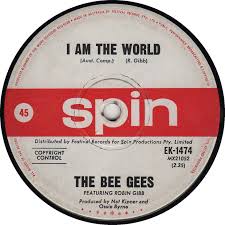| "I Am the World" | ||||
|---|---|---|---|---|
 | ||||
| Single by Bee Gees | ||||
| A-side | "Spicks and Specks" | |||
| Released | September 1966(Australia) February 1967(United Kingdom) | |||
| Recorded | June–July 1966 | |||
| Genre | Pop, baroque pop | |||
| Length | 2:35 | |||
| Label | Spin (Australia) Polydor (United Kingdom) | |||
| Songwriter(s) | Robin Gibb | |||
| Producer(s) | Nat Kipner, Ossie Byrne | |||
| Bee Gees flipsidessingles chronology | ||||
| ||||
"I Am the World" is a song recorded by the Bee Gees, written and sung by Robin Gibb. It was released as the B-side of "Spicks and Specks". Later, it was included on the compilation Rare, Precious and Beautiful, Vol. 3 in 1969. It featured trumpet played by Geoff Grant. Its CD version was released in 1998 on the compilation Brilliant from Birth. [1]